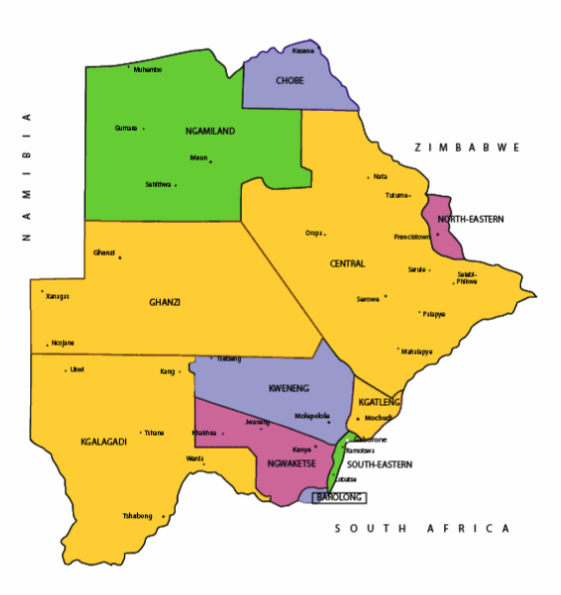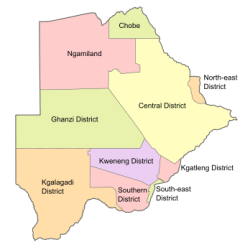Places and their polling stations in Letlhakeng-Lephephe, Botswana
364 Moshaweng-Monwane
1674 Moshaweng Primary School
1675 Moshaweng Main Kgotla
1676 Mmamoagi VDC Huts
1677 Monwane Primary School
1678 Maothate VDC
1679 Tent at Tshamagwe
365 Mantshwabisi
1680 Serinane Primary School
1681 Mantshwabisi Primary School
1682 Matlagatse VDC Huts
1683 Tent at Mapharangwane Settlement
366 Letlhakeng South
1684 Letlhakeng Primary School
1685 Tent at Goo-Moiphisi Ward
1686 Letlhakeng Main Kgotla
1687 Legononong Kgotla
1688 Mphuthe JSS
367 Letlhakeng North
1689 Molehele Kgotla
1690 Gothibamang Primary School
1691 Motshoto Kgotla
1692 Shageng Kgotla
1693 Mpolaakeswe Kgotla
1694 Kgesakwe Mobile Stop
368 Botlhapatlou
1695 Botlhapatlou Primary School
1696 Botlhapatlou Community Hall
1697 Maphallwane VDC Huts
1698 Malwelwe Primary School
1699 Malwelwe Community Hall
1700 Marapyane Mobile Stop
1701 Tent at Letlapeng
1702 Tent at Ditladi
1703 Mmaphoroka VDC Huts
1704 Mosekele VDC Huts
1705 Kosie Mobile Stop
369 Ngware
1706 Ngware Primary School
1707 Diphuduhudu Primary School
1708 Tent at Dinonyane Borehole
1709 Shadishadi Primary School
1710 Shonono Mobile Health Stop
1711 Tent at Seitsante Mobile Health Stop
1712 Shadishadi Kgotla
370 Sojwe
1713 Sojwe Primary School
1714 Sojwe Tribal Offices
1715 St. John Apostolic Church
1716 Kokonje Mobile Health Stop
1717 Tent at Mahetlhe
371 Boatlaname-Leologane
1718 Boatlaname Primary School
1719 Lephephe Primary School
1720 Leologane Primary School
1721 Motlabaki Mobile Health Post
1722 Boatlaname Community Hall
1723 Tent at Gatalathutwa Borehole
1724 Leologane Kgotla
Reference: iec.gov.bw/index.php/electoral-districts/polling-stations.html
Botswana
Botswana is a country in Africa. It is topographically flat, with approximately 70 percent of its territory being the Kalahari Desert.
It is bordered by South Africa to the south and southeast, Namibia to the west and north, and Zimbabwe to the northeast.
Capital: Gaborone
Currency: Botswanan Pula
Official language: English
Population: 2.588 million (2021) World Bank
Dialing code: +267
Gross Domestic Product: 17.61 billion USD (2021) World Bank
Botswana’s ten districts are:
- Southern District
- South-East District
- Kweneng District
- Kgatleng District
- Central District
- North-East District
- Ngamiland District
- Kgalagadi District
- Chobe District
- Ghanzi District
Botswana’s councils created from urban or town councils are: Gaborone City, Francistown, Lobatse Town, Selebi-Phikwe Town, Jwaneng Town, Orapa Town and Sowa Township.






The name Botswana refers to ‘Land of the Tswana’. The landlocked, Southern Africa country is officially known as the Republic of Botswana.














Botswana is connected to Zambia through the Kazungula Bridge making it the world’s shortest border between two countries.
A country of slightly over 2 million people (2021), Botswana is one of the most sparsely populated countries in the world. It is essentially the nation state of the Tswana ethnic group, who make up 79% of the population.

About 11.6 per cent of the population lives in the capital and largest city, Gaborone.
Formerly one of the world’s poorest countries—with a GDP per capita of about US$70 per year in the late 1960s—it has since transformed itself into an upper-middle-income country, with one of the world’s fastest-growing economies.


The Tswana ethnic group were descended mainly from Bantu-speaking tribes who migrated southward of Africa to modern Botswana, living in tribal enclaves as farmers and herders.




In 1885, the British colonised the area and declared a protectorate under the name of Bechuanaland.
As colonisation stopped, Bechuanaland became an independent republic under its current name on 30 September 1966.


Since then, it has been a representative republic, with a consistent record of uninterrupted democratic elections and the lowest perceived corruption ranking in Africa since at least 1998.

The economy is dominated by mining and tourism. Botswana has a GDP (purchasing power parity) per capita of about $18,113 as of 2021, one of the highest in subsaharan Africa.


Botswana is the world’s biggest diamond producing country.
Its relatively high gross national income per capita gives the country a high standard of living and the third-highest Human Development Index of continental Sub-Saharan Africa (after Gabon and South Africa).
The country has been adversely affected by the HIV/AIDS epidemic. In 2002, Botswana began offering anti-retroviral drugs (ARVs) to help combat the epidemic.
Botswana is a member of the Southern African Customs Union, the Southern African Development Community, the Commonwealth of Nations, and the United Nations.
